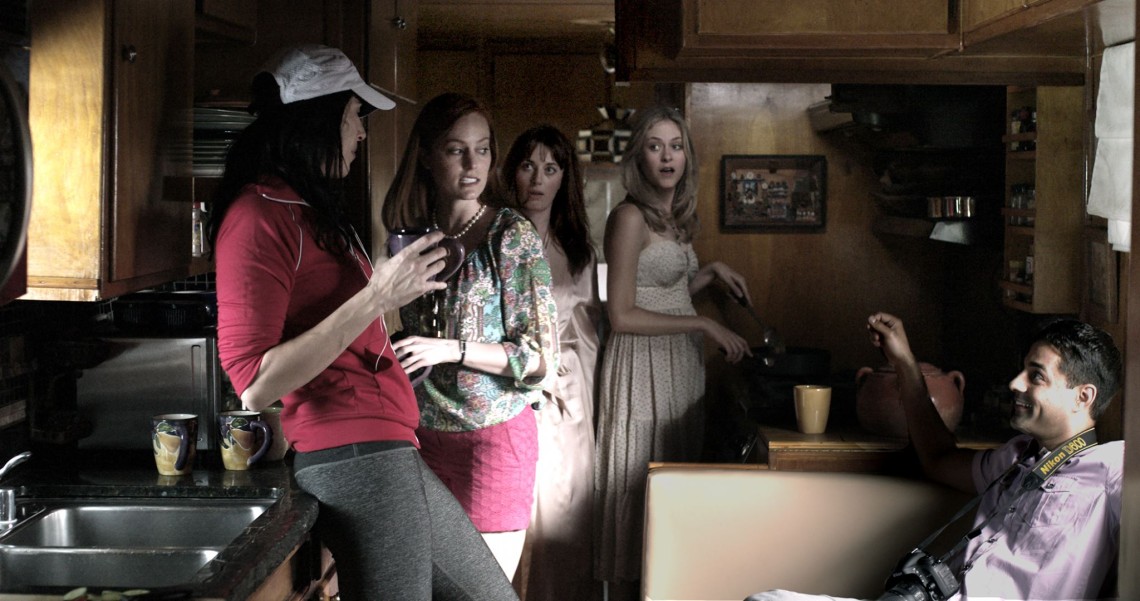Third-wave feminist theory extrapolates that, in the modern age, women face threats on two fronts. It’s not just that men perpetuate systems of patriarchy that marginalize and objectify women, but also that societal mores constantly pit women against one another, whether that be in competition for a job, mate, or social dominance. Bridesmaids played the commonality of this female sniping for big laughs, giving Maya Rudolph the instantly immortal line, “Why can’t you be happy for me, and then go home and talk about me behind my back like a normal person?!” Jane Clark’s Crazy Bitches also takes on these fraught dynamics of female friendships as its guiding subject. But instead of couching thoughtful observations in natural, deeply felt comedy, it uses the vessel of a shoddy slasher flick and errs on the side of didacticism. At long last, here is a horror film that has learned to respect its women, but forgets how to entertain in the process.
Estrogen hangs heavy in the air when seven former sorority gal-pals reunite at a ranch for a weekend of R&R (rustic decor & red wine). But before the vino can adequately breathe, the female camaraderie has given way to the usual feline tendencies that afflicted the girls during their days at A-K-Pi. The infighting and simmering resentments may be hurtful, but the arrival of a lunatic who kills vain women—aptly named the Vanity Killer—forebodes graver danger.
The filmmaking, however, is as unimaginative as the murderer’s name. Clark awkwardly imposes a horror narrative on these cartoonish characters, and exposes her own inexperience in the process. While little things hint that Clark doesn’t quite get it (soundtrack selections that would more appropriately score interstitial footage from The O.C., a character saying the words “Crazy bitches!” for no other reason than it’s the title, etc.), it’s the tone-deaf horror scenes that expose she’s in over her head.
Crazy Bitches’ righteous social-justice agenda ticks so many commendable boxes. The film passes the Bechdel test with flying colors, assembling a nearly all-female cast with representation for women of color and transgender women. Clark’s script demonstrates a refreshing, serviceable knowledge of critical feminist, queer, and racial theory. The characters can hold their own when discussing the finer points of intersectionality and sexual fluidity. But that’s just the problem: there’s discussion, and more discussion, and further discussion. Crazy Bitches is all tell and no show; it’s comfortable with oral thinkpieces but unwilling or unable to actually illustrate these ideas outside of momentum-stalling flashbacks. Obviousness detracts from the ideological power of the film’s admirably pro-feminist undercurrent. The men of the film are creeping menaces, typified by a cocksure cowboy who drops the following bon mot on Vivianna (Candis Cayne): “You’re like a tall drink of water with a great ass.” Clark has imbued her film with political content meriting cheers. If only her story rang half as true as her denunciations of sexist norms.
Meanwhile, the gals’ flamboyant cohort, BJ, produces his own DIY-style webseries about paranormal activity, which, to muddle a metaphor, acts as something of a double-sided trap door. His macabre knowledge base makes for an easy way out when looking for someone to unload hoary exposition upon. (A bunch of girls died at the ranch 15 years ago! Or whatever!) But more frustratingly, the camcorder glued to his hands gives Clark an opening to needlessly play with the found-footage form. It disrupts an already-indistinct visual style and only serves to hack away at what makes this film worth a damn — the insightful analysis of tensions between characters.
Judging from the title alone, Clark fancies Crazy Bitches a satirical deconstruction of the generally misogynistic slasher genre — a low-key Cabin In The Woods acoustic cover, if you will. She invokes iconic horror tropes such as creepy hillbillies, weekend getaways, and mystical Ouija boards, but fails to interact with them, or parody them, in a meaningful or hilarious way. Clark wants so badly to convey her noble ideologies about life as a woman in 2015. Unfortunately for her, she can’t naturally work them into a palatable narrative. Her heart’s in the right place, but when she gets stabbed in it, it doesn’t bleed. Only words spill out.




















